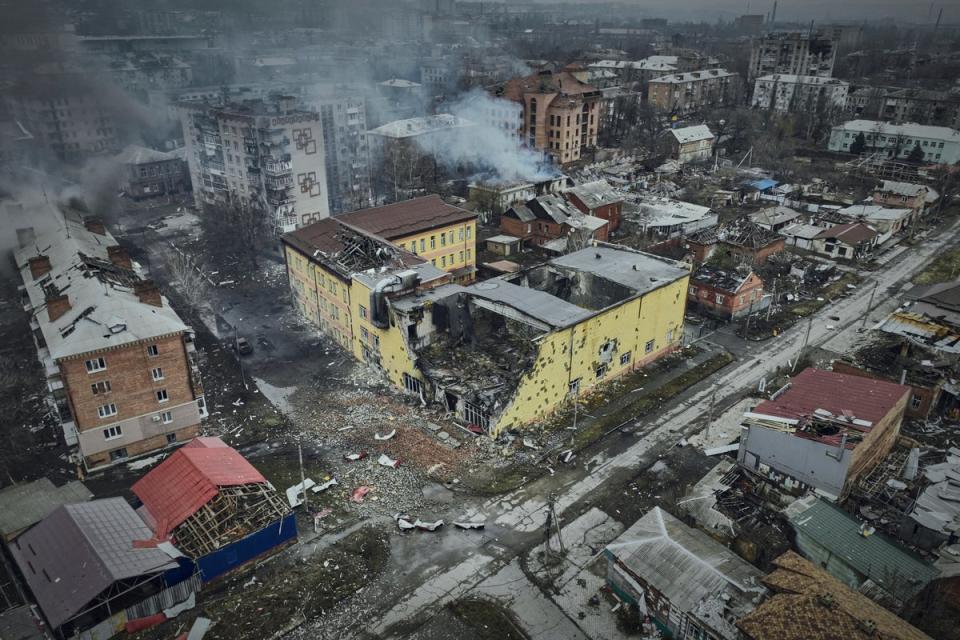Putin’s Wagner Group ‘private army’ has been badly damaged in battle for Bakhmut, its chief admits

The head of Vladimir Putin’s “private army” admitted on Wednesday that his mercenary force had been badly damaged in fierce battles for the eastern town of Bakhmut.
Yevgeny Prigozhin, chief of the Wagner Group, accepted his troops, many of which have been recruited straight from Russian jails, have suffered heavy casualties.
Reports suggest they are being thrown into battle as “cannon fodder”.
Bakhmut in the Donetsk province in east Ukraine has been the target of a Russian offensive, led by Wagner soldiers, in one of the longest and bloodiest battle of Putin’s war launched in February 2022.
"The battle for Bakhmut today has already practically destroyed the Ukrainian army, and unfortunately, it has also badly damaged the Wagner Private Military Company," Prigozhin said in an audio message.
Ukrainian forces have held out in the town, despite expectations that they might withdraw.
They have suffered heavy losses but are widely believed to have inflicted far higher casualties on the Russian military.
Military experts estimate that Putin’s forces have seen between five to eight casualties for each Ukrainian one.
Russian officials say their troops are still capturing ground in street-by-street fighting inside Bakhmut, but have so far failed to encircle it and force the Ukrainians to withdraw, as had seemed likely weeks ago.
British military intelligence said on Wednesday the Ukrainians had successfully pushed the Russians back from one of the city's main supply routes.
But other reports said Wagner mercenaries had seized an industrial complex.
Volodymyr Zelensky warned on Wednesday that defeat in the battle for Bakhmut would allow Putin to “feel blood” to push for Ukraine to accept a peace deal surrendering land.
The Ukrainian president issued the dire prediction amid reports that Putin’s forces now controlled around two thirds of the town.
He stressed that If Bakhmut fell, Putin would “sell this victory to the West, to his society, to China, to Iran”.
He added: “If he will feel some blood - smell that we are weak - he will push, push, push.”
Ukraine has surprised some military analysts by not withdrawing from Bakhmut as it is not a strategically important town.
But Mr Zelensky emphasised that a loss anywhere at this stage in the war could put Ukraine’s hard-fought momentum at risk.
“We can’t lose the steps because the war is a pie - pieces of victories. Small victories, small steps,” he said.
Putin’s spring offensive has failed to make any significant gains, according to military experts, and Ukraine is now building up brigades and training on western-supplied tanks, including British Challenger IIs, long-range artillery and other heavy weaponry before launching a counter-offensive expected within weeks.
But the Washington-based Institute for the Study of War said it was “likely” that the Wagner mercenaries, many of them recruited directly from Russian jails, had captured the AZOM industrial complex in northern Bakhmut and continued to make gains within the town.
The group, which is said to have suffered very heavy losses, may also be getting closer to the town centre and Palace of Culture.
But Ukrainian military chiefs insisted their forces were still repelling Russian advances on Bakhmut and nearby Avdiivka in the Donetsk province.
“The enemy continues its assault on the city of Bakhmut. However, our defenders courageously hold the city, repel numerous enemy attacks,” Ukraine’s General Staff said, adding that Ukrainian forces had fended off 57 Russian attacks on Bakhmut and other towns.
Britain’s defence ministry said Russian forces had made only “marginal progress” in an attempt to encircle Avdiivka and had lost many armoured vehicles and tanks.
But Denis Pushilin, the Russian-installed leader of the part of Donetsk region under Moscow’s control, said most Ukrainian forces had pulled back from a metals factory in western Bakhmut and Russian forces were making progress.
As advanced Western battle tanks, including British Challenger IIs, began to arrive in Ukraine ahead of an anticipated counter-offensive by its forces, Russia’s RIA news agency reported that Moscow had sent its troops hundreds of new and refurbished tanks.
Ukrainian President Volodymyr Zelensky, who visited two northern towns and trenches near the Russian border on Tuesday, spoke in his nightly video address of the international response to Russia’s February 2022 invasion of his country, saying it “reminds the world that Russian aggression could be ended considerably more quickly than is sometimes said”.
Away from the battlefields of the biggest land conflict in Europe since World War Two, Russian ally Belarus said its decision to host Russian tactical nuclear weapons was a response to Western sanctions and what it said was a military build-up by NATO member states near its borders.
US President Joe Biden indicated he would be concerned by the decision although the United States said it had not seen any indications that Russia was closer to using tactical nuclear weapons in Ukraine.
Russia had begun exercises with its Yars intercontinental ballistic missile system and several thousand troops, its defence ministry said, in what is likely to be seen as another attempt by Moscow to show off its nuclear strength.

 Yahoo Movies
Yahoo Movies 